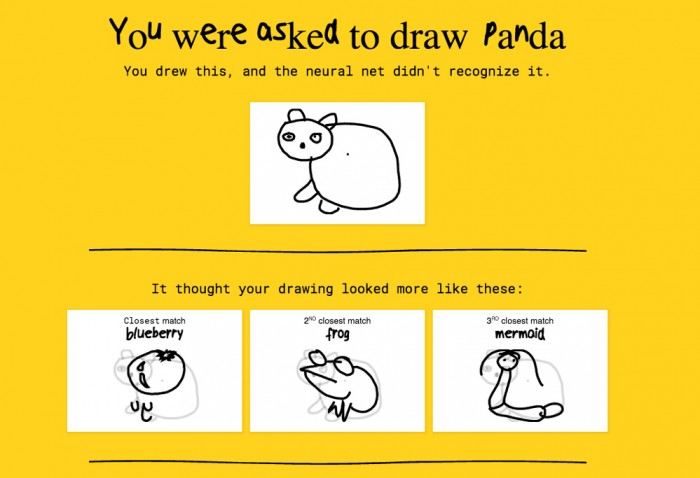Want to Understand AI? Try Sketching a Duck for a Neural Network
Google has released a handful of AI experiments that tap into advances in machine learning in creative ways.
They include Quick, Draw!, a game in which an algorithm tries to guess what you’re sketching, A.I. Duet, which lets you compose pieces of music with a creative computer, and ways to visualize how neural networks represent information and see the world.
The projects show off some new AI features Google has built into an overhauled cloud computing platform. But they also help make AI less mysterious, and hint at ways in which the technology may become more accessible to all of us.
Take Quick, Draw!, for example. You have 20 seconds to draw six simple objects, and a computer tries to guess what you’re working on in the allotted time. Under the hood, the game runs a learning system that Google uses for character recognition. The system analyzes not only the shape, but also the strokes you used to draw it. It’s a neat way to understand a machine-learning approach that’s used by millions on their smartphones. It’s also quite addictive, even if it always seems to mistake my ducks for potatoes.

In in A.I. Duets, you get to make music with an algorithm. Through an effort called Project Magenta, Google researchers are exploring ways of using neural networks to mimic human creativity. The results are fascinating, especially because how musical creativity works remains rather mysterious. Part of the motivation for Google's project, indeed, is exploring human intelligence by copying its musicality.
Among the projects aimed at elucidating the inner workings of neural networks is one called Visualizing High Dimensional Space. Created by several experts in data visualization, this effort shows how a large neural network stores and draws connections between different pieces of data.
The results are often beautiful, but they also highlight one way that we might be able to understand powerful machine-learning systems that would normally be inscrutable.
This could be pretty important for everyone. Imagine, for example, an algorithm that just flagged an apparently healthy patient as likely to develop a particular disease. The ability to inspect a network's inner connections could make that decision less difficult to understand, and make treatment easier to justify.
So if you want to understand the revolution in machine intelligence that’s upending just about every industry, Google's online AI laboratory is well worth a visit.
(Read more: A.I. Experiments, Silicon Angle, "OK, Computer, Write Me A Song,” "The Hit Charade,” "AI's Language Problem”)
Keep Reading
Most Popular
Large language models can do jaw-dropping things. But nobody knows exactly why.
And that's a problem. Figuring it out is one of the biggest scientific puzzles of our time and a crucial step towards controlling more powerful future models.
The problem with plug-in hybrids? Their drivers.
Plug-in hybrids are often sold as a transition to EVs, but new data from Europe shows we’re still underestimating the emissions they produce.
Google DeepMind’s new generative model makes Super Mario–like games from scratch
Genie learns how to control games by watching hours and hours of video. It could help train next-gen robots too.
How scientists traced a mysterious covid case back to six toilets
When wastewater surveillance turns into a hunt for a single infected individual, the ethics get tricky.
Stay connected
Get the latest updates from
MIT Technology Review
Discover special offers, top stories, upcoming events, and more.